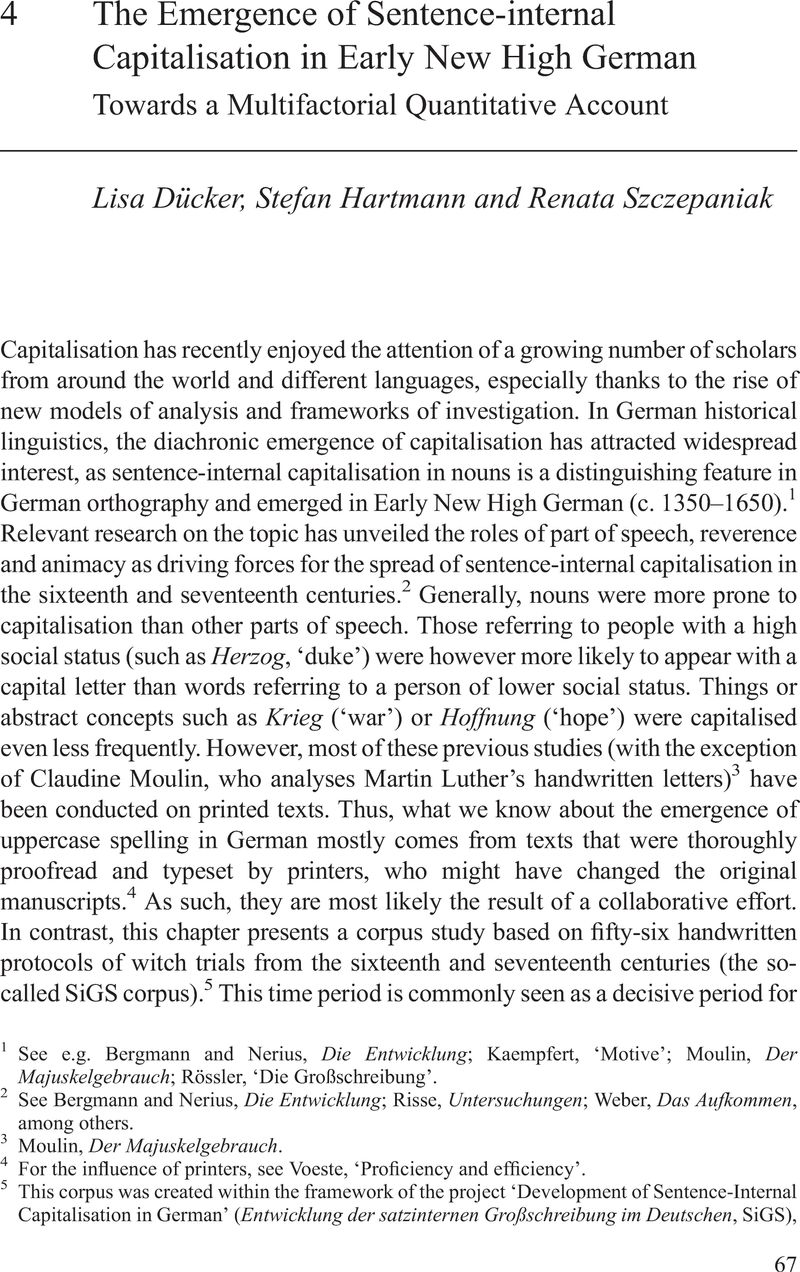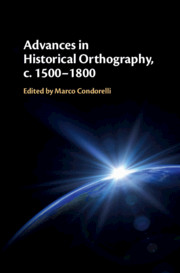Book contents
- Advances in Historical Orthography, c. 1500–1800
- Advances in Historical Orthography, c. 1500–1800
- Copyright page
- Contents
- Figures
- Tables
- Contributors
- 1 From the Early Modern Era to an International Research Area
- 2 A Phonological–Graphemic Approach to the Investigation of Spelling Functionality, with Reference to Early Modern Polish
- 3 Graphematic Features in Glagolitic and Cyrillic Orthographies
- 4 The Emergence of Sentence-internal Capitalisation in Early New High German
- 4.1 State of the Art
- 4.2 The SiGS Corpus: Handwritten Protocols of Witch Trials
- 4.3 Corpus Analysis
- 4.4 Socio-pragmatic Factors in the Emergence of Capitalisation
- 4.5 Towards a Framework for Capitalisation in Early Modern Languages
- Appendix 4A Results of Hierarchical Configural Frequency Analysis on the SiGS Corpus
- 5 Punctuation in Sixteenth- and Seventeenth-century French and Spanish Grammars
- 6 Orthographic Variation and Materiality of a Manuscript Pre-standard Lithuanian Spellings in Simonas Daukantas’s ‘History of the Lithuanian Lowlands’ (1831–4)
- 7 Investigating Methods Intra-textual, Inter-textual and Cross-textual Variable Analyses
- 8 Orthography and Group Identity A Comparative Approach to Studying Orthographic Systems in Early Modern Czech Printed and Handwritten Texts (c. 1560‒1710)
- 9 Orthographic Solutions at the Onset of Early Modern Croatian
- 10 Women’s Spelling in Early Modern English
- 11 Towards a Relativity of Spelling Change
- 12 Synergic Dialogue in Historical Orthography National Philologies, Comparability and Questions for the Future
- Bibliography
- Index
Appendix 4A - Results of Hierarchical Configural Frequency Analysis on the SiGS Corpus
from 4 - The Emergence of Sentence-internal Capitalisation in Early New High German
Published online by Cambridge University Press: 02 November 2020
- Advances in Historical Orthography, c. 1500–1800
- Advances in Historical Orthography, c. 1500–1800
- Copyright page
- Contents
- Figures
- Tables
- Contributors
- 1 From the Early Modern Era to an International Research Area
- 2 A Phonological–Graphemic Approach to the Investigation of Spelling Functionality, with Reference to Early Modern Polish
- 3 Graphematic Features in Glagolitic and Cyrillic Orthographies
- 4 The Emergence of Sentence-internal Capitalisation in Early New High German
- 4.1 State of the Art
- 4.2 The SiGS Corpus: Handwritten Protocols of Witch Trials
- 4.3 Corpus Analysis
- 4.4 Socio-pragmatic Factors in the Emergence of Capitalisation
- 4.5 Towards a Framework for Capitalisation in Early Modern Languages
- Appendix 4A Results of Hierarchical Configural Frequency Analysis on the SiGS Corpus
- 5 Punctuation in Sixteenth- and Seventeenth-century French and Spanish Grammars
- 6 Orthographic Variation and Materiality of a Manuscript Pre-standard Lithuanian Spellings in Simonas Daukantas’s ‘History of the Lithuanian Lowlands’ (1831–4)
- 7 Investigating Methods Intra-textual, Inter-textual and Cross-textual Variable Analyses
- 8 Orthography and Group Identity A Comparative Approach to Studying Orthographic Systems in Early Modern Czech Printed and Handwritten Texts (c. 1560‒1710)
- 9 Orthographic Solutions at the Onset of Early Modern Croatian
- 10 Women’s Spelling in Early Modern English
- 11 Towards a Relativity of Spelling Change
- 12 Synergic Dialogue in Historical Orthography National Philologies, Comparability and Questions for the Future
- Bibliography
- Index
Summary

- Type
- Chapter
- Information
- Advances in Historical Orthography, c. 1500–1800 , pp. 89 - 92Publisher: Cambridge University PressPrint publication year: 2020

